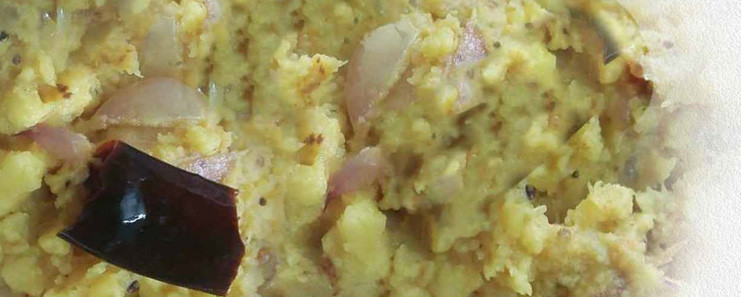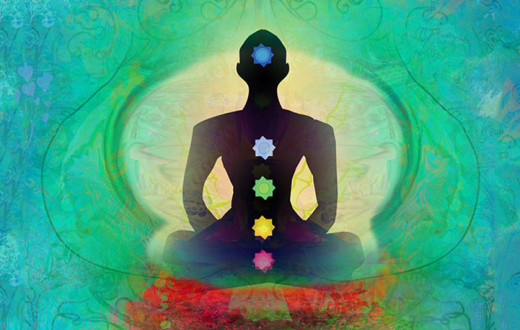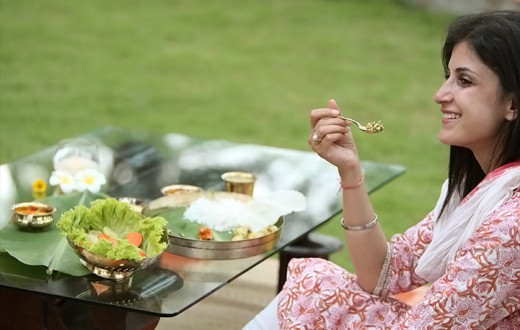Fasting during Navratri is an ideal way to detox, build immunity during the changing season, and raise your pranic energy. However, fasting is not always beneficial. If you fast in a way unsuited to your body, it will backfire on you. You may feel sick, and experience indigestion and fatigue instead of the rejuvenation you expect from fasting.
So how do you decide what to eat and what not to eat during a fast?
It all depends on your Ayurvedic body type. Each person is influenced by certain elements more than others because of their natural constitution, which is categorized into three doshas.
Vata dosha - where the air and space elements dominate
Pitta dosha - where the fire element dominates
Kapha dosha - where the earth and water elements dominate
Find out your Ayurvedic body type
Each of our bodies is a unique combination of the 5 elements present in nature: Earth, Water, Fire, Air & Space. The system of Ayurveda is based on the understanding that every body is unique, and recommends different lifestyles for each body type, for every season! Take this short quiz to find out your unique Body Type! Are you earth, fire, water or air?
Vata (Air Power!)
Vata is a force made up of elements - ether and air. People with a predominance of Vata will be vibrant, dynamic and creative!
Pitta (Fire Power!)
Pitta is a force created by the interplay of water and fire. Pitta predominant people are focused, determined, and target oriented!
Kapha (Earth Power!)
Kapha is the equilibrium of earth and water. Kapha predominant people are calm, kind & resourceful, and make for very good managers!
Which of these best describes you?
Which of these best describes you?
Which of these best describes you?
Which of these best describes you?
Which of these best describes you?
Which of these best describes you?
Which of these best describes you?
Which of these best describes you?
Which of these best describes you?
Which of these best describes you?
Note - An individual’s constitution is composed of two doshas. A Nadi Pariksha doctor can check your pulse and tell you about both the doshas.
Why you should fast as per your doshas
Your doshas create mental and physical disturbances when you eat food or fast in a way that puts them in imbalance. When you eat and fast as per your dominating doshas, you nourish your body instead of weakening it and reap fasting benefits. Let us know the common fasting mistakes that create an imbalance in your doshas, the possible effects, and the fasting tips for balance.
How to fast to avoid Vata imbalance (Esp. important for Vata people)
| Common fasting mistake | Effects of imbalance | Fasting tips for balanced Vata |
|
| Easy-to-digest and filling:
|

How to fast to avoid Pitta imbalance
| Common fasting mistakes | Effects of imbalance | Fasting tips for balanced Pitta |
|
| Liquid diet -
|

How to fast to avoid Kapha imbalance
Common fasting mistakes | Effects of imbalance | Fasting tips for balanced Kapha |
|
|
|
Fasting tips for all
- Eat with mindfulness: chew a morsel of food at least 32 times. Chewing produces saliva in your mouth which is alkaline. When consuming anything liquid, sip and swirl it in the mouth before gulping down.
- Avoid salt & chilies: Use lemon, herbs, spices, and honey for flavor.
- Avoid white sugar: Use mishri and jaggery instead.
- Avoid fried and starchy food items: Instead, consume foods high in nutritional value like non-grain superfoods and herbs.
Based on inputs by Kaushani Desai, Faculty, Holistic Cooking Program
An individual is influenced by the elements (water, fire, space, earth and air) more than others according to their natural constitution. Ayurveda suggests fasting in Navratri depending on your body constitution - vata, kapha and pitta. Some observe nine days of fasting on water, fruits and/or steamed vegetables while others limit themselves to one meal a day. Some fast in pairs (the first two or the last two or the first and last day of Navratri).
Mostly Navratri fast ends on the 8th or 9th day. After Devi and Kanjak (Kanya) pooja, devotees end their fast. It is suggested to eat in moderation as the body has been on fast and the body's metabolism needs time to be attuned.
We fast for 9 days in Navratri, for these reasons:
* Fasting results in a calmer mind helping you plunge deeper into meditations.
* Fasting rekindles the digestive fire. An increase in the digestive fire burns the toxins in the body.
* Fasting helps in de-stressing and building immunity.
It is believed that any luxury must be minimized when observing a fast. Since Navratri is the sacred festival of fasting and prayers, it is advised for people to sleep on the floor (Bhoomi Shayan) at night. Taking a short nap during the day benefits only people with vata dominating. Afternoon naps increase pitta and kapha.
Yes, you can be physically active while Navratri fasting. It is an incorrect notion that while fasting you should be resting as the body is not getting the regular diet. Continue doing your regular work if you are fasting on fruits and/or steamed vegetables or one meal a day. Avoid strenuous activities. You may rest during the afternoon.






























































